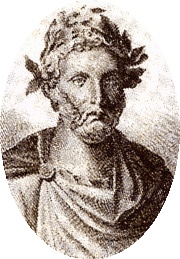Тит Ма́кций Плавт , очень часто просто Плавт — выдающийся римский комедиограф, мастер паллиаты. Написал около 130 комедий, из которых сохранилось 20.
Родовое имя Макций более ни у кого не встречается; это псевдоним, имя одной из масок народной комедии — дурака и обжоры. Прозвище Плавт, буквально «плоскостопый», указывает на плясуна-мима, выступающего в обуви с плоской подошвой.
Прибыв в Рим, Плавт поступил служителем в актёрскую труппу, затем занимался торговлей, но неудачно, после чего работал по найму; в свободное время писал комедии. У Плавта не было патронов-аристократов — он зависел от массового зрителя. Плавту пришлось много путешествовать и встречаться с людьми, принадлежащими к разнообразным прослойкам населения Италии.
Большую роль в пьесах Плавта играют рабы, благодаря которым действие часто разворачивается и подводится к развязке. В комедиях почти всегда фигурируют прихлебатель и сводник. В основе комедий часто лежит любовная интрига, но все они оканчиваются благополучно для главного героя. При этом женские роли на сцене исполнялись мужчинами.
Язык его произведений был сродни народному; шутки зачастую непристойные, а действие полно обескураживающих выходок. Использовал музыкальное сопровождение.
Единственный полный перевод комедий Плавта на русский язык выполнен А. В. Артюшковым .
Wikipedia
✵
254 до н.э. – 184 до н.э.
•
Другие имена
Titus Marccius Plautus,
Тит Макций Плавт
